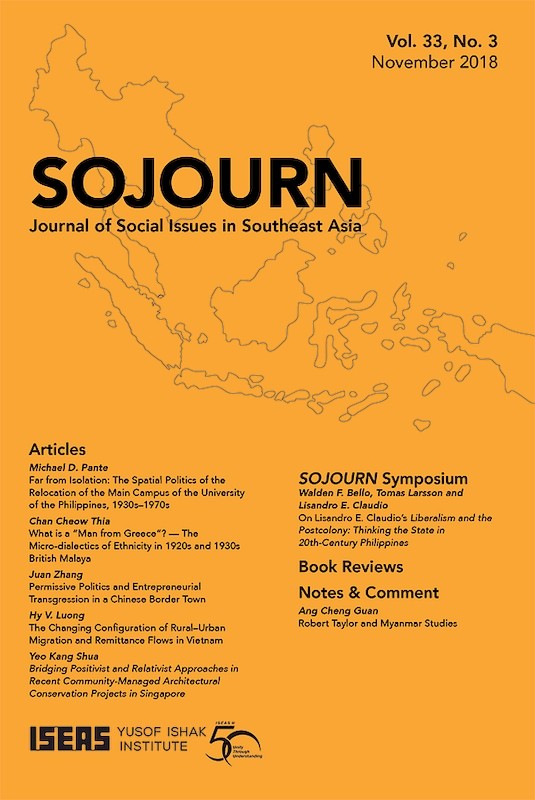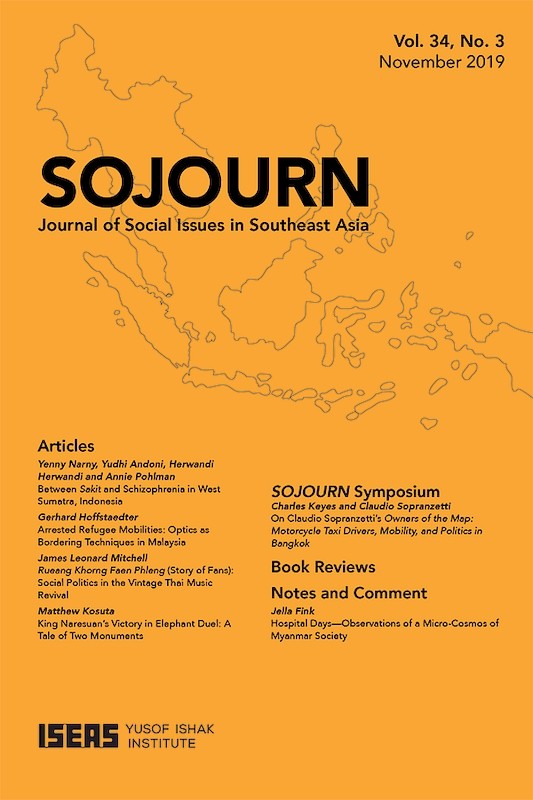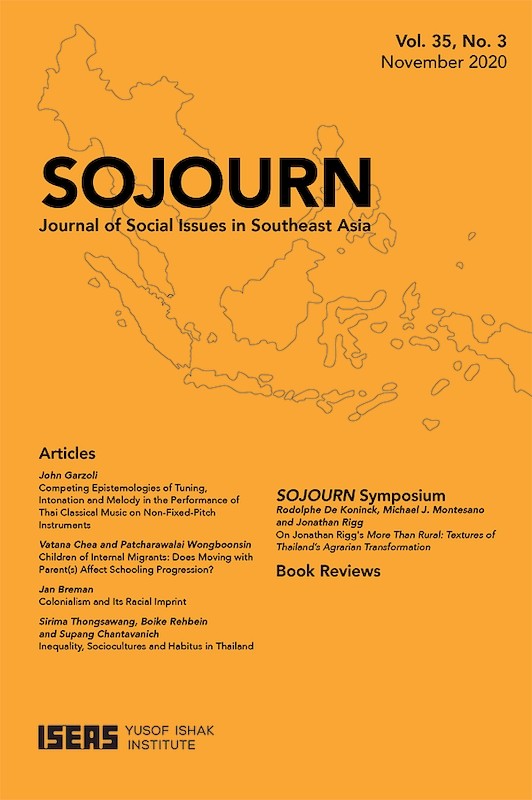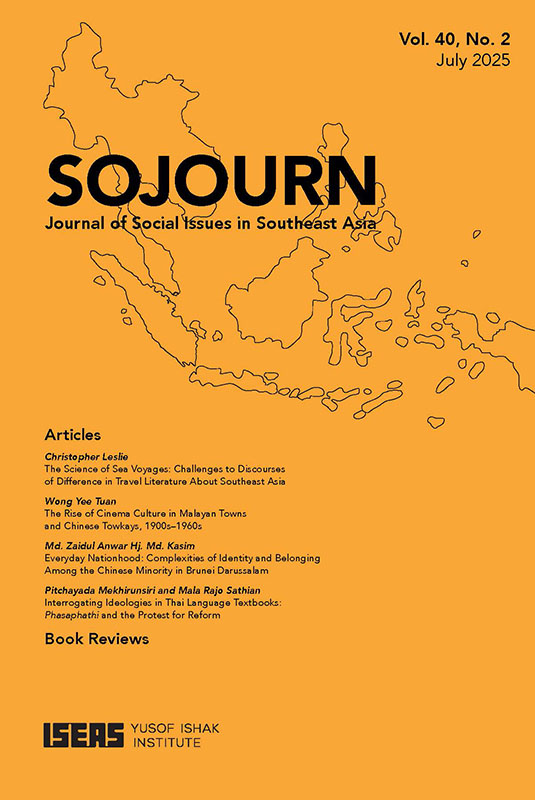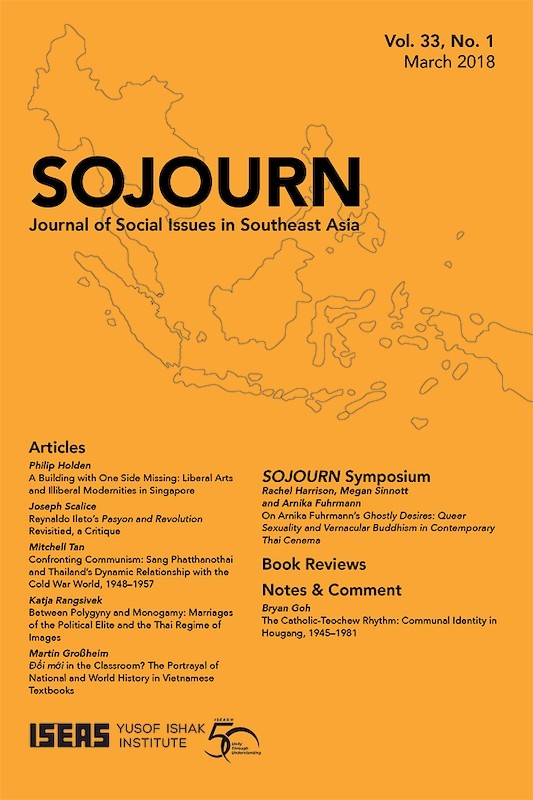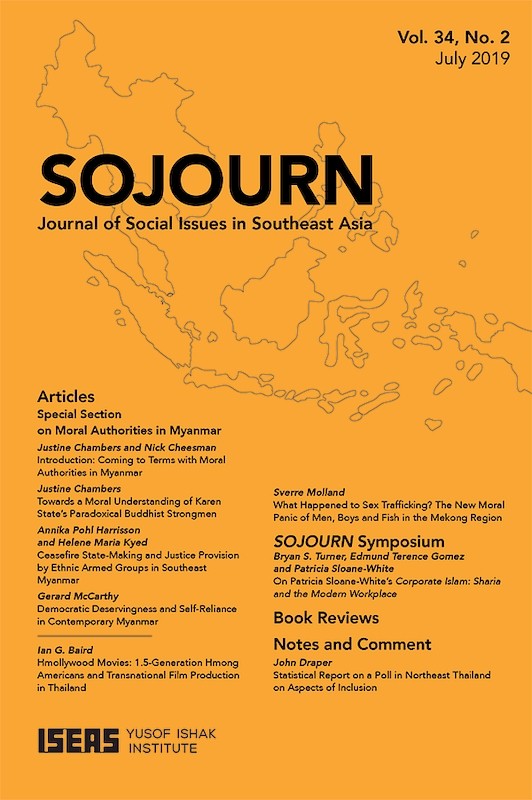SOJOURN: Journal of Social Issues in Southeast Asia Vol. 37/2 (July 2022)
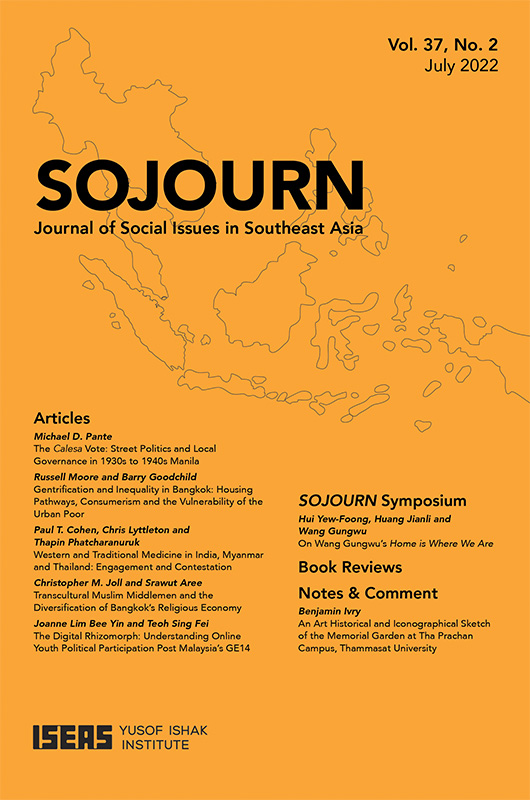
Date of publication:
July 2022
Publisher:
ISEAS – Yusof Ishak Institute
Number of pages:
203
Code:
SJ37/2
Soft Cover
ISSN: 02179520
Contents
-
SOJOURN: Journal of Social Issues in Southeast Asia Vol. 37/2 (July 2022)
[Whole Publication, ISSN: 17932858] -
Preliminary pages
- ARTICLES
-
The Calesa Vote: Street Politics and Local Governance in 1930s to 1940s Manila, by Michael D. Pante, author see abstractThe <i>cocheros </i>(drivers of horse-drawn vehicles) of early twentieth-century Manila posed an interesting paradox in the theatre of populist politics. By the 1930s they were among the most economically deprived occupational group, as their <i>carromatas</i> and <i>calesas</i> (horse-drawn vehicles) struggled to compete with the electric tram and automobiles. Yet, simultaneously, these <i>cocheros</i> were a strong political force because of the so-called ‘<i>calesa</i> vote’: they wielded an inordinate level of clout vis-à-vis Manila councillors because of the number of voters they could influence. Their collusion with city officials represents an early instance of populism, which remains potent in Philippine politics at present.
-
Gentrification and Inequality in Bangkok: Housing Pathways, Consumerism and the Vulnerability of the Urban Poor, by Russell Moore, Barry Goodchild, authors see abstractThis study reports on the housing experiences and pathways of different populations living in a gentrifying neighbourhood in Bangkok—newcomers living in condominiums, original residents who have managed to remain and others who have been evicted. The respondents’ accounts reveal contrasting life stories of hardship and progress. For poorer residents, gentrification intensified existing vulnerabilities, and evictions or the threat of evictions disrupted their ability to maintain stable lifestyles and livelihoods. For the more affluent, gentrification offered new lifestyle opportunities and new ways of enhancing personal and family interests. It also promoted for them a renegotiation of family arrangements. Gentrification is a local and personal process but one that is conditioned by broader economic forces and the inequalities of class. The theoretical challenge of gentrification is therefore to provide an account that considers the interaction between the varied experiences of individuals, their biographical habitus, and the differential vulnerabilities of distinct social classes and their structural habitus.
-
Western and Traditional Medicine in India, Myanmar and Thailand: Engagement and Contestation, by Paul T Cohen, Chris Lyttleton, Thapin Phatcharanuruk, authors see abstractScientific medicine has been inextricably linked to the development of modern state governmentality, ensuring its hegemony in the West and regions colonized by Western powers. In this context, we examine the historical and contested relationship between biomedicine and traditional medicine in three Asian countries—India, Myanmar and Thailand. We argue that selective regulation of a narrowly defined ‘traditional medicine’ subordinates other forms of traditional healing that are incompatible with scientific paradigms and associated metrics of accreditation. Yet, these marginalized forms of ‘folk healing’ that emphasize spiritual dimensions of health increasingly assist with contemporary mental health problems arising from rapid capitalist development.
-
Transcultural Muslim Middlemen and the Diversification of Bangkok’s Religious Economy, by Christopher M Joll, Srawut Aree, authors see abstractThis article examines how Bangkok’s religious economy has been diversified by Ahmad Wahab (1883–1956), Direk Kulsiriswad (also known as Ibrahim Qureshi) (1922–2005) and Sheikh Rida Ahmad Samadi (1969–) from the 1920s onwards. In addition to engaging with a series of recent empirically rich contributions from Thai Muslim scholars, we introduce elements of Nile Green’s conceptual framework—such as ‘religious economies’, ‘terrains of exchange’ and ‘transcultural religious entrepreneurs’—that bring into focus how developments in Bangkok resemble accounts of religious change elsewhere. We completed local case studies around the time that other scholars were documenting Muslim elements of central Bangkok’s cultural kaleidoscope that highlighted the complex cultural geography of Bangkok’s Muslim enclaves and transnational connections with the wider Muslim world.
-
The Digital Rhizomorph: Understanding Online Youth Political Participation Post Malaysia’s GE14 by Joanne Lim Bee Yin and Teoh Sing Fei, by Joanne Lim Bee Yin, Teoh Sing Fei, authors see abstractSince the eleventh general elections in 2004, Malaysia’s ‘convergence’ mediascape has revealed new affordances in youth politics (see Jenkins 2006, pp. 2–3). Consistent with the perceived characteristics of a digitized culture in political participation, ‘rhizomorphic’ behaviour is observed (see Lim 2017, pp. 217–23) and further examined in this study—undertaken fifteen years later, in 2020—following the country’s first ever regime change in the 2018 general elections (GE14). Referencing Deleuze and Guattari’s (1987, pp. 3–25) ‘schizoanalysis’, this study sheds light on how Malaysian youths creatively and purposefully deterritorialize and reterritorialize their political desires. Specifically, this paper observes the political mediascape post-GE14 via a database from Malaysia’s ‘Twitter-verse’ and a collective of civil society groups (e.g., Projek Dialog, Warga Dunia, Borneo Komrad) in order to substantiate the idea of a ‘digital rhizomorph’. The digital rhizomorph is defined in this study as a body of contemporary youth politics that are more experimental and collaborative than hierarchical in character. The digital rhizomorph offers a more nuanced understanding of the original concept of the ‘rhizome’, often reflecting and morphing based on several key factors identified in the fieldwork.
- SOJOURN SYMPOSIUM
-
On Home Is Where We Are by Wang Gungwu with Margaret Wang, by Hui Yew-Foong, Huang Jianli, Wang Gungwu, authors
- BOOK REVIEWS
-
BOOK REVIEW: Chinese Theatre Troupes in Southeast Asia: Touring Diaspora, 1900s–1970s by Beiyu Zhang, by Emily Wilcox, author
-
BOOK REVIEW: Postcolonial Hangups in Southeast Asian Cinema: Poetics of Space, Sound, and Stability by Gerald Sim, by Palita Chunsaengchan, author
-
BOOK REVIEW: Thai Cinema Uncensored by Matthew Hunt, by Annette Hamilton, author
-
BOOK REVIEW: Woman between Two Kingdoms: Dara Rasami and the Making of Modern Thailand by Leslie Castro-Woodhouse, by Katherine Bowie, author
-
BOOK REVIEW: Empire’s Mistress, Starring Isabel Rosario Cooper by Vernadette Vicuña Gonzalez, by Luis Zuriel P Domingo, author
-
BOOK REVIEW: Celluloid Colony: Locating History and Ethnography in Early Dutch Colonial Films of Indonesia by Sandeep Ray, by Gerda Jansen Hendriks, author
-
BOOK REVIEW: Fluid Jurisdictions in the Indian Ocean – Arab Diaspora under Colonial Rule by Nurfadzilah Yahaya, by Iza Hussin, author
-
BOOK REVIEW: In Camps: Vietnamese Refugees, Asylum Seekers, and Repatriates by Jana K. Lipman, by Tuan Hoang, author
- NOTES & COMMENT
-
An Art Historical and Iconographical Sketch of the Memorial Garden at Tha Prachan Campus, Thammasat University, by Benjamin Ivry, author

